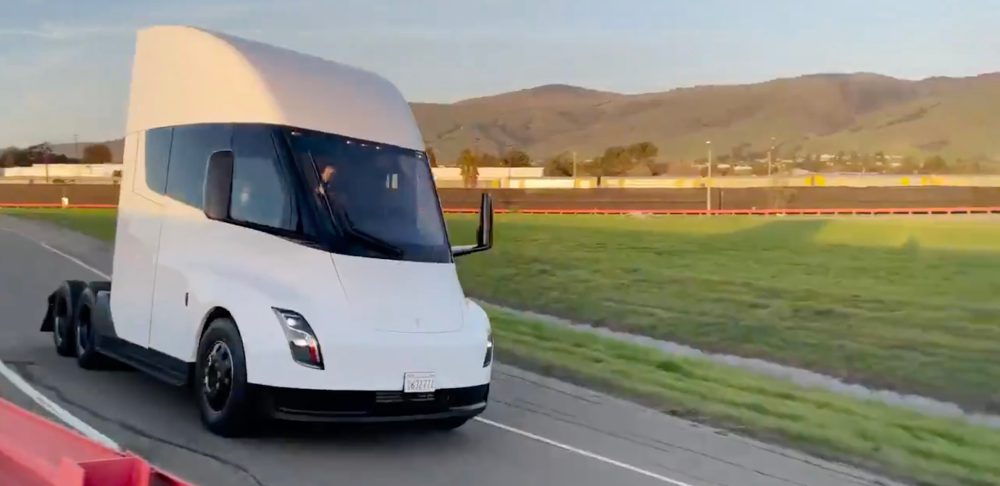15 Tesla Semi electric trucks are expected to be delivered to PepsiCo this year - Electrek
PepsiCo says that it is expecting 15 Tesla Semi electric trucks by the end of the year, giving us better insights into Tesla’s plan to produce and deliver the electric truck.
The Tesla Semi program has been delayed several times, but it looks like the automaker is finally preparing to start production and deliveries.
Last summer, CEO Elon Musk told employees in an email obtained by Electrek that “it’s time to bring Tesla Semi to volume production” without updating the timeline.
More recently, Tesla has indicated that the electric truck would enter production this year with some deliveries to customers.
We have been seeing some evidence of that actually happening with new Tesla Semi prototypes being spotted for the first time since the original two prototypes unveiled in 2017.

It’s unclear what kind of volume Tesla can achieve with the electric truck program this year, but now we are getting an idea through a project with PepsiCo.
After the launch of Tesla Semi in 2017, PepsiCo placed one of the biggest orders for Tesla Semi: 100 electric trucks to add to their fleet.
The company planned to use some of those trucks for a project to turn its Frito-Lay Modesto, California, site into a zero-emission facility.
Today, PepsiCo issued an update on the project:
When launching Tesla Semi in 2017, the automaker said that the production versions of the electric truck, which is a class 8 truck with an 80,000-lb capacity, will have 300-mile and 500-mile range options for $150,000 and $180,000, respectively.
Tesla is expected to update the specs of the Tesla Semi when unveiling the production version, which could happen soon.
The automaker was recently spotted filming the latest version of the electric truck at its factory.
PepsiCo says that it is expecting 15 Tesla Semi electric trucks by the end of the year, giving us better insights into Tesla’s plan to produce and deliver the electric truck.
The Tesla Semi program has been delayed several times, but it looks like the automaker is finally preparing to start production and deliveries.
Last summer, CEO Elon Musk told employees in an email obtained by Electrek that “it’s time to bring Tesla Semi to volume production” without updating the timeline.
More recently, Tesla has indicated that the electric truck would enter production this year with some deliveries to customers.
We have been seeing some evidence of that actually happening with new Tesla Semi prototypes being spotted for the first time since the original two prototypes unveiled in 2017.

It’s unclear what kind of volume Tesla can achieve with the electric truck program this year, but now we are getting an idea through a project with PepsiCo.
After the launch of Tesla Semi in 2017, PepsiCo placed one of the biggest orders for Tesla Semi: 100 electric trucks to add to their fleet.
The company planned to use some of those trucks for a project to turn its Frito-Lay Modesto, California, site into a zero-emission facility.
Today, PepsiCo issued an update on the project:
Those “15 electric tractors” are Tesla Semi trucks, and the company confirmed that they are expected by the end of the year:“To date, the equipment and infrastructure in place at the site includes nearly 60 tractors, box trucks, yard trucks or forklifts powered by electric, lithium-ion technologies or natural gas with renewable attributes, with the remaining 15 electric tractors expected to deploy later this year. Infrastructure to support the project incorporates an adjacent natural gas station with renewable attributes, as well as solar carports, battery storage, truck charging systems and employee electric vehicle charging stations.”
Tesla has many customers who placed large deposits to reserve their electric trucks, but they weren’t communicated clear timelines for deliveries.15 Tesla Semis are expected to be added to the fleet by the end of 2021.
When launching Tesla Semi in 2017, the automaker said that the production versions of the electric truck, which is a class 8 truck with an 80,000-lb capacity, will have 300-mile and 500-mile range options for $150,000 and $180,000, respectively.
Tesla is expected to update the specs of the Tesla Semi when unveiling the production version, which could happen soon.
The automaker was recently spotted filming the latest version of the electric truck at its factory.


